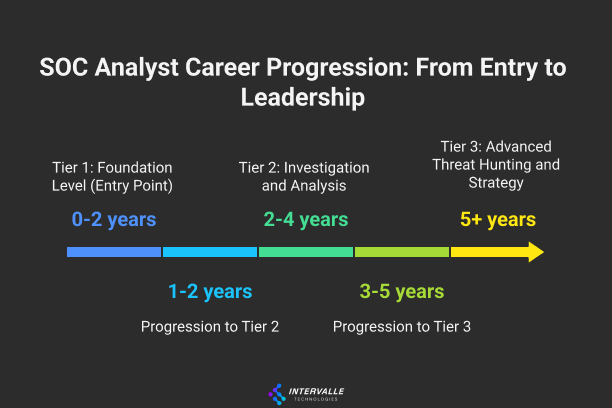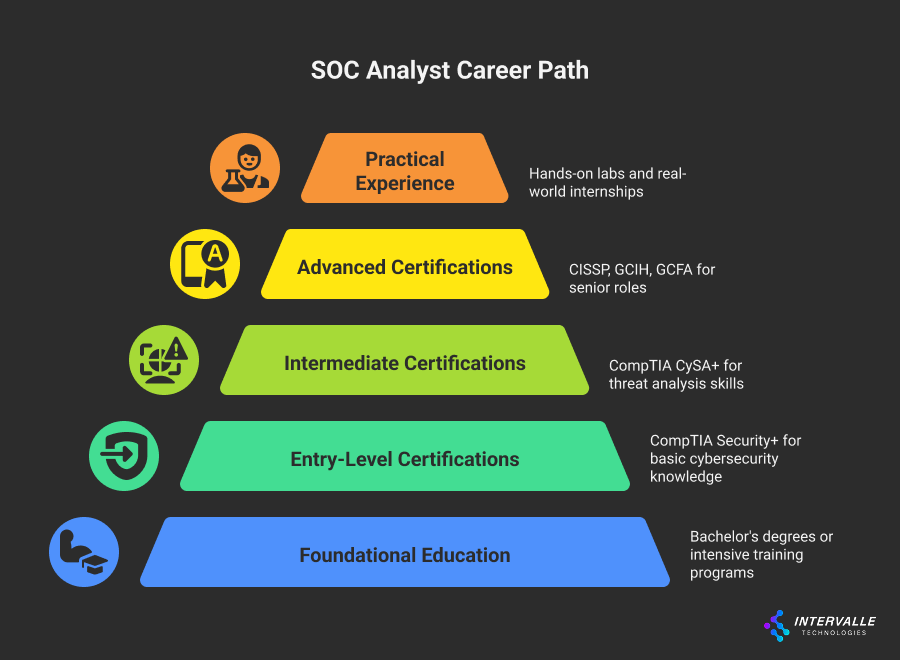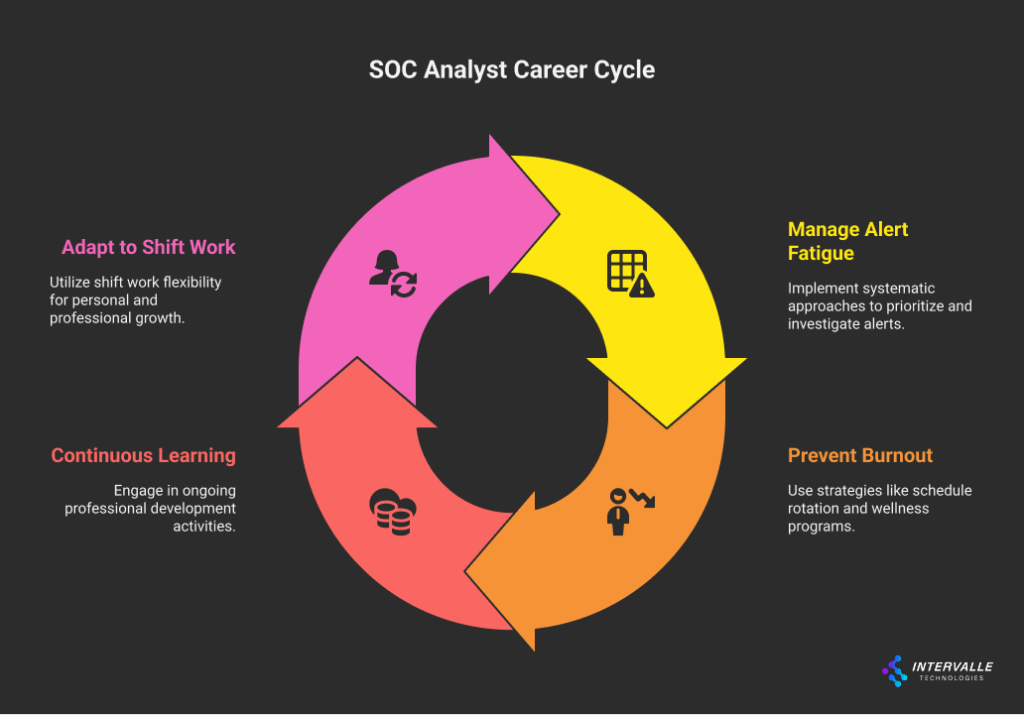SOC Analyst Career Guide: Skills, Salaries, and Strategic Progression for 2025
The SOC analyst career path represents one of cybersecurity's most critical and rapidly growing specializations. As digital guardians protecting organizations from an estimated $8 trillion in annual cybercrime costs, SOC analysts serve as the frontline defense in our increasingly connected world. This comprehensive guide examines everything from entry-level requirements to senior-level compensation, providing the roadmap you need to build a successful career in Security Operations Centers.
The Growing Demand: Why SOC Analyst Careers Are Exploding
The cybersecurity landscape has fundamentally shifted. According to the U.S. Bureau of Labor Statistics, information security analyst positions—including SOC roles—are projected to grow by 32% between 2022 and 2032, nearly ten times faster than the average occupation. This explosive growth reflects a harsh reality: organizations are under constant siege from sophisticated cyber threats.

Consider the numbers. The median SOC receives approximately 10,000 security alerts every day, according to the Ponemon Institute. Yet despite this overwhelming volume, roughly 50% of cybersecurity teams remain understaffed according to ISACA's State of Cybersecurity 2023 report. This staffing shortage creates unprecedented opportunities for skilled professionals entering the SOC analyst career field.
The financial impact drives this demand. Cybersecurity Ventures estimates that cybercrime costs reached $8 trillion globally in 2023, with projections climbing to $10.5 trillion by 2025. Organizations recognize that investing in skilled SOC analysts isn't just a security measure—it's business survival.
However, the role comes with unique challenges. Approximately 64% of SOC professionals report "alert fatigue" as a primary concern, while up to 70% experience burnout symptoms according to Devo's 2023 research. Understanding these realities is crucial for anyone considering a SOC analyst career path.
Understanding SOC Analyst Roles: From Digital Guardian to Strategic Defender
A SOC analyst career encompasses far more than passive monitoring. These professionals function as digital guardians, combining technical expertise with analytical thinking to protect organizational assets. The role requires real-time surveillance using sophisticated tools like SIEM platforms, intrusion detection systems, and firewalls.
Unlike penetration testers who focus on offensive security, SOC analysts specialize in defensive operations. They identify threats, coordinate incident responses, and maintain the continuous vigilance that modern cybersecurity demands. This distinction is critical for workforce planning and career development.
The core responsibilities span multiple domains. Primary duties include real-time threat monitoring, incident response coordination, threat intelligence integration, and comprehensive documentation for compliance and post-incident analysis. Each responsibility requires specific technical competencies and contributes to overall security posture.
Daily operations involve heavy alert triage, often processing hundreds of potential threats per shift. SOC analysts must quickly distinguish genuine incidents from false positives, escalate critical threats appropriately, and maintain detailed records for forensic analysis and compliance reporting.
The Three-Tier SOC Analyst Career Progression System

Tier 1: Foundation Level (Entry Point)
Tier 1 SOC analysts handle basic alert triage and event log review. This entry-level position typically requires 0-2 years of experience and serves as the foundation for SOC analyst career advancement. Responsibilities include initial alert assessment, basic incident categorization, and escalation to higher tiers when necessary.
The progression from Tier 1 to Tier 2 typically takes 1-2 years, depending on individual performance and organizational needs. Key performance metrics include Mean Time To Respond (MTTR), false positive rate reduction, and successful incident escalations.
Tier 2: Investigation and Analysis
Tier 2 analysts conduct detailed incident investigations and root cause analysis. This intermediate level requires deeper technical knowledge and typically 2-4 years of experience. Professionals at this tier manage complex security events, perform forensic analysis, and begin developing specialized expertise in specific threat vectors.
Career advancement from Tier 2 to Tier 3 or management positions generally requires 3-5 years of demonstrated expertise. Advanced certifications and specialized skills become increasingly important at this level.
Tier 3: Advanced Threat Hunting and Strategy
Tier 3 represents the senior practitioner level, focusing on proactive threat hunting and advanced detection techniques. These professionals typically possess 5+ years of experience and serve as technical leaders within SOC environments. They develop custom detection rules, conduct threat intelligence analysis, and mentor junior team members.
Beyond Tier 3, career paths diverge into specialized engineering roles, SOC management, or broader cybersecurity leadership positions. Some professionals transition into consulting, threat intelligence, or offensive security roles.
Essential Technical Skills: Building Your SOC Analyst Career Foundation
Core Technical Competencies
SIEM platform expertise forms the backbone of SOC analyst careers. Leading platforms include Splunk, IBM QRadar, and Microsoft Sentinel. Proficiency in these tools enables effective log analysis, correlation rule development, and incident investigation.
Scripting capabilities in Python and PowerShell significantly enhance career prospects. Automation skills become increasingly valuable as organizations seek to address alert fatigue and improve operational efficiency. According to the SANS 2023 SOC Survey, 91% of SOCs are investing in automation technologies.
Network protocol knowledge remains fundamental. Understanding TCP/IP, DNS, HTTP/HTTPS, and other protocols enables analysts to identify anomalous network behavior and investigate complex incidents effectively.
Threat intelligence integration requires familiarity with platforms like VirusTotal, AlienVault OTX, and commercial threat feeds. This capability enables proactive threat hunting and improves detection accuracy.

Incident Response Frameworks
NIST Cybersecurity Framework and ISO 27001 knowledge provides structured approaches to incident management. These frameworks guide response procedures, ensure compliance, and facilitate communication with stakeholders during security incidents.
Vulnerability management using tools like Nessus, OpenVAS, and Qualys enables comprehensive security assessment and risk prioritization. This knowledge becomes particularly valuable for senior SOC analyst career positions.
Emerging Technologies
Cloud security knowledge grows increasingly important as organizations migrate to AWS, Azure, and Google Cloud platforms. Cloud security represents the fastest-growing segment with 25% compound annual growth rate.
Artificial intelligence and machine learning familiarity positions analysts for future opportunities. These technologies increasingly supplement traditional detection methods and require new analytical approaches.
Educational Pathways and Professional Certifications
Formal Education Requirements
According to CyberSeek 2023 data, 87% of SOC analysts possess bachelor's degrees. Computer science, cybersecurity, information systems, or related technical degrees provide strong foundations for SOC analyst careers.
However, alternative pathways are gaining traction. Bootcamp and online course completion rates are growing by 30% annually, reflecting industry recognition of skills-based hiring. Many successful analysts enter the field through intensive training programs rather than traditional four-year degrees.

Critical Certifications
CompTIA Security+ serves as the foundational certification for entry-level positions. This vendor-neutral credential demonstrates basic cybersecurity knowledge and often represents the minimum requirement for government and contractor positions.
CompTIA CySA+ (Cybersecurity Analyst) specifically targets SOC analyst career development. This intermediate certification covers threat detection, analysis, and response—core competencies for professional advancement.
Advanced certifications like CISSP, GCIH (GIAC Certified Incident Handler), and GCFA (GIAC Certified Forensic Analyst) enable progression to senior positions and specialized roles.
According to the ISC² Workforce Study 2023, 74% of security positions require one or more industry certifications. This statistic underscores the importance of continuous professional development in SOC analyst careers.
Practical Experience Development for a SOC Analyst
Hands-on laboratory experience proves invaluable for skill development. Platforms like TryHackMe, Hack The Box, and Cybrary provide practical scenarios that simulate real-world SOC environments.
Home laboratory setups enable continuous learning and experimentation. Virtual environments using VMware or VirtualBox allow analysts to practice incident response, malware analysis, and tool configuration without organizational constraints.
Internships and entry-level positions provide crucial real-world experience. Many organizations offer structured SOC analyst training programs that combine classroom instruction with supervised operational experience.
Compensation Analysis: SOC Analyst Career Financial Prospects
Salary Expectations by Experience Level for a SOC Analyst
Entry-level SOC analyst positions in the United States typically offer $60,000-$90,000 annually. Geographic location significantly impacts compensation, with major metropolitan areas like San Francisco and New York City offering up to 30% above national averages.
Mid-level positions (2-5 years experience) generally provide $90,000-$120,000 annually. These roles often include incident response leadership responsibilities and specialized technical expertise.
Senior SOC analysts and team leads earn $120,000-$160,000+ annually. These positions typically require extensive experience, advanced certifications, and demonstrated leadership capabilities.
Total Compensation Considerations
Beyond base salary, SOC analyst career compensation includes comprehensive benefits packages. Health insurance, retirement contributions, professional development funding, and flexible work arrangements add significant value to total compensation.
The shift toward remote work has expanded opportunities significantly. Currently, 40-50% of SOC roles offer remote or hybrid work options, enabling access to higher-paying positions regardless of geographic location.
Stock options, bonuses, and profit-sharing arrangements become more common at senior levels and in technology companies. These additional compensation elements can substantially increase total earnings.
Market Demand Indicators
Over 30,000 SOC analyst positions remain open globally as of 2024, indicating strong sustained demand. This figure represents significant opportunity for career entry and advancement.
Competition for experienced professionals drives salary inflation. Organizations increasingly offer signing bonuses, accelerated promotion timelines, and enhanced benefits to attract qualified candidates.
Overcoming Common Challenges in SOC Analyst Careers
Managing Alert Fatigue and Burnout
Alert fatigue represents a significant occupational hazard. Processing thousands of daily alerts while maintaining accuracy and speed creates substantial cognitive burden. Successful analysts develop systematic approaches to alert prioritization and investigation.
Burnout affects up to 70% of SOC professionals, making stress management crucial for long-term career success. Effective strategies include regular schedule rotation, professional development activities, and maintaining work-life boundaries.
Organizations increasingly recognize these challenges and implement supportive measures. Automation tools, improved staffing ratios, and wellness programs help mitigate occupational stress.

Continuous Learning Requirements
The threat landscape evolves rapidly, requiring constant skill updates. New attack techniques, emerging technologies, and evolving compliance requirements demand continuous professional development.
Successful SOC analyst careers require commitment to lifelong learning. Industry conferences, technical training, certification maintenance, and peer networking facilitate ongoing skill development.
Shift Work and Operational Requirements
SOC operations require 24/7/365 coverage, necessitating shift work including nights, weekends, and holidays. This operational reality impacts work-life balance and requires careful career planning.
However, shift work often provides schedule flexibility during traditional business hours. Many analysts pursue additional education, certifications, or side projects during off-peak periods.
Industry Trends Shaping Future SOC Analyst Careers
Automation and AI Integration
Artificial intelligence and automation technologies increasingly supplement human analysts. Rather than replacing positions, these tools enable analysts to focus on complex investigations and strategic activities.
SOAR (Security Orchestration, Automation, and Response) platforms automate routine tasks like initial alert triage and basic incident response. This evolution creates opportunities for analysts to develop higher-value skills and advance their careers.
Cloud Security Specialization
Cloud adoption drives demand for specialized cloud security skills. AWS, Azure, and Google Cloud certifications become increasingly valuable for SOC analyst career advancement.
Hybrid and multi-cloud environments create complex monitoring challenges. Analysts who develop expertise in cloud-native security tools and practices position themselves for premium opportunities.
Threat Intelligence Evolution
Threat intelligence capabilities mature from reactive information sharing to proactive threat hunting. Advanced analysts develop skills in threat modeling, attribution analysis, and strategic intelligence assessment.
Integration of threat intelligence with detection and response capabilities enables more effective and efficient SOC operations. These capabilities become differentiators for senior positions.
Building Your SOC Analyst Career: Actionable Next Steps
Immediate Actions for Career Entry
Begin with foundational certifications like CompTIA Security+. This credential provides credibility and demonstrates commitment to cybersecurity professionals.
Develop hands-on skills through laboratory environments and practical exercises. Employers value demonstrable technical capabilities over theoretical knowledge alone.
Network actively within the cybersecurity community. Professional associations like ISACA, ISC², and local security groups provide valuable connections and career opportunities.
Mid-Career Advancement Strategies
Pursue specialized certifications aligned with career goals. GCIH for incident response, GCDA for data analysis, or CISSP for management track advancement.
Develop leadership and communication skills. Senior positions require ability to coordinate across teams, communicate with executives, and manage complex projects.
Contribute to the professional community through writing, speaking, or training activities. Thought leadership enhances professional reputation and creates advancement opportunities.
Long-term Career Planning
Consider advanced degrees for senior leadership positions. MBA or master's in cybersecurity programs provide strategic business knowledge valuable for executive roles.
Explore adjacent career paths like consulting, sales engineering, or product management. SOC experience provides valuable foundation for diverse cybersecurity careers.
Maintain broad technical awareness while developing deep specializations. The most successful professionals combine extensive experience with focused expertise areas.
How Managed SOC Services Enable Career Development
Organizations increasingly partner with Managed Security Service Providers (MSSPs) to supplement internal capabilities. These partnerships create unique career development opportunities for SOC professionals.
MSSPs like Intervalle Technologies provide exposure to diverse environments, advanced toolsets, and specialized expertise. Analysts gain experience across multiple industries and threat landscapes, accelerating professional development.
Managed SOC environments often feature mature processes, advanced automation, and comprehensive training programs. These elements provide structured learning opportunities and clear advancement pathways.
The combination of managed services and internal capabilities creates hybrid career paths. Professionals can transition between client-side and service provider roles, gaining diverse perspectives and expanding skill sets.
Professional Training and Certification Programs
Structured training programs provide accelerated paths into SOC analyst careers. Programs covering CISSP, CEH (Certified Ethical Hacker), and specialized SOC analyst curricula combine theoretical knowledge with practical application.
Quality training programs feature hands-on laboratories, real-world scenarios, and instructor guidance from experienced practitioners. These elements ensure graduates possess job-ready skills and industry-relevant knowledge.
Certification maintenance requirements ensure ongoing professional development. Regular recertification activities keep skills current and demonstrate continued commitment to professional excellence.
Conclusion: Your SOC Analyst Career Journey Starts Now
The SOC analyst career path offers exceptional opportunities for motivated cybersecurity professionals. With 32% projected job growth, competitive salaries ranging from $60,000 to $160,000+, and diverse advancement options, this field provides both financial rewards and professional satisfaction.
Success requires strategic planning, continuous learning, and practical skill development. The combination of technical expertise, industry certifications, and hands-on experience creates the foundation for long-term career success.
The challenges are real—alert fatigue, shift work, and high-stress environments require careful management. However, the rewards justify the investment: meaningful work protecting organizational assets, competitive compensation, and extensive career advancement opportunities.
Whether you're considering career entry or planning advancement to senior positions, the SOC analyst career path offers unlimited potential for growth and professional development.
Ready to accelerate your SOC analyst career? Explore Intervalle Technologies' comprehensive training programs covering CISSP, CEH, and specialized SOC analyst curricula. Our expert-led courses combine theoretical knowledge with practical, hands-on experience to prepare you for immediate career success. Contact us today to discuss how our managed SOC services and training programs can support your cybersecurity career objectives.
